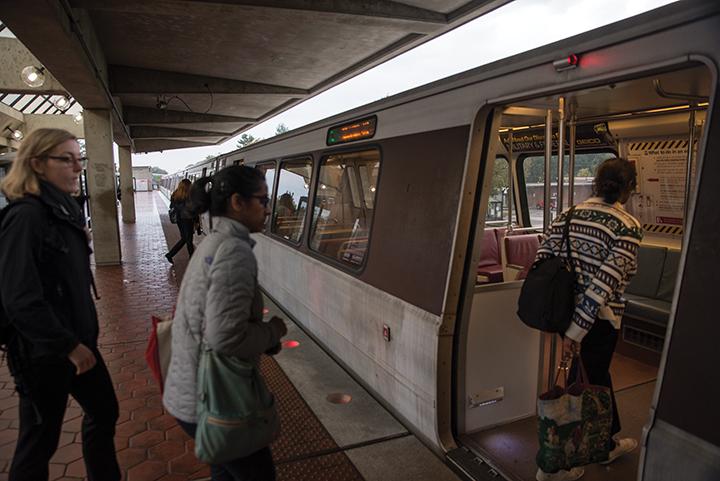University of Maryland Residence Hall Association President Steve Chen takes the metro into Washington three days a week for his internship, and it costs him about $120 per month. It wasn’t until he spoke with a friend from nearby American University that he considered another way to fund his travels.
“I was talking with a friend at American [University], and she was telling me about how they don’t have to pay for metro fares, and I was like ‘Whoa, how is that possible?'” said Chen, a senior biology and public health major. His friend cited a program initiated at American University this fall.
So Chen authored an RHA resolution encouraging the Department of Transportation Services and “relevant senior administrators” to consider implementing a similar program at this university.
The resolution passed 47-0 with no abstentions at RHA’s senate meeting Tuesday.
The American University program, which was adopted by an “overwhelming” student vote last year, began as a pilot program this fall, according to American University’s website. All undergraduate, graduate and law students at the university receive unlimited access to the Metrorail and Metrobus for a fee of $130 per semester. The program is intended to reduce students’ travel costs and minimize the hassles and environmental cons of driving cars.
Chen said a system like American’s could help the university make good on promises to prospective students.
“The university often sells our location as extremely close to the nation’s capital,” Chen said. “So I think that’s an important thing to consider when weighing the pros and cons of such a proposal.”
The goal of the proposal is to incite DOTS to investigate different ways students can access Washington-based educational opportunities, Chen said.
“Part of the rationale for doing this is to make sure that no academic or internship opportunities are lost because students can’t afford to travel to their internships,” he said.
DOTS Director David Allen said he tried to implement a similar program in the past to no avail.
“We spoke with Metro, and we wanted to be the first to do this in the area, but the cost was more than what students currently pay for all of our transit service right now,” Allen said. “The amount of money being asked for was basically almost every student using it, which we know not every student would.”
The Metro asked for $6 million, he said. However, he has ideas on other ways to fund students’ Metro usage.
“[The RHA] could even propose that we discontinue a particular bus route or hours just to cut back and get some money back,” Allen said. “It either needs to be more revenue or less service.”
Chen described the process as an “entire campus conversation,” and added the RHA would likely conduct informal polling of the student body to get a better sense of the campus’ opinion.
RHA Transportation Advisory Committee Chairman Matt O’Brien, a freshman enrolled in letters and sciences, said he supports the idea for the program and hopes DOTS will look into the proposal.
“You pay more than $130 for a textbook for your class, and that’s for yourself,” O’Brien said. “We here are a community of students at the University of Maryland, and we’re supposed to support one another.”
RHA senator Daniel Laffin disagreed with O’Brien’s notion, however.
“I don’t see it as justifiable to force everyone to pay for some people’s transportation,” said Laffin, a freshman government and politics major.
Full-time undergraduate students currently pay about $933 in mandatory fees, including fees for technology, athletics and shuttle buses, among other things, according to the Office of the Bursar website.



